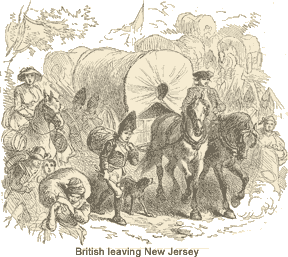The winter of 1777-78 was one of relative ease for British forces under General William Howe. They occupied the American capital of Philadelphia, having dispatched the rebel Congress in ignominious flight to York, Pennsylvania. Philadelphia’s large loyalist population wined and dined the officers and Howe conducted an open affair with the wife of consenting Joshua Loring Jr., a prosperous prison contractor. The general’s inclination to enjoy the comforts of urban life precluded an effort to engage Washington’s forces at nearby Valley Forge, but it did anger Howe’s superiors. Benjamin Franklin, then the American diplomatic representative in France, was asked if Howe had taken Philadelphia; he responded that, in truth, Philadelphia had taken Howe. In the spring, a replacement was sent in the person of Sir Henry Clinton. British commanders had received word in early 1778 that a French fleet was on its way to America; Louis XVI’s government was intent on aiding the patriot cause in the wake of the British failure at Saratoga in October of the previous year. France had initially doubted America’s resolve and ability to wage an effective war against Britain, but was now willing to cast its lot with the upstart colonists. Clinton moved quickly to return to the British safe haven in New York City, fearing that if he remained in Philadelphia he would risk being surrounded by hostile forces. It was anticipated that the French fleet would soon control Chesapeake Bay and the Delaware River, and in so doing drive a wedge between the British armies. On June 18, Clinton began the evacuation, giving frightened loyalists first crack at the waiting ships; this left the bulk of the British force to proceed across New Jersey on foot. The long queue of soldiers, loyalists, wagons and baggage stretched out for 10 miles.

 Both sides claimed victory at Monmouth. British losses were considerably higher than the Americans (approximately 1,200 casualties to 300), but the latter force was further depleted by heavy desertions. The patriot forces took credit for their enemy’s flight from Philadelphia and New Jersey, and experienced a large boost in morale. Most historians regard this battle as a tactical draw.
Charles Lee’s conduct was curious at best. He resented his dismissal by Washington and demanded a court-martial. He was found guilty of disobedience and willful neglect of duty, and was sentenced to a one-year suspension. This verdict was later upheld by the Congress, but Lee refused to accept the suspension. He was then expelled from the army and retired into obscurity.
Both sides claimed victory at Monmouth. British losses were considerably higher than the Americans (approximately 1,200 casualties to 300), but the latter force was further depleted by heavy desertions. The patriot forces took credit for their enemy’s flight from Philadelphia and New Jersey, and experienced a large boost in morale. Most historians regard this battle as a tactical draw.
Charles Lee’s conduct was curious at best. He resented his dismissal by Washington and demanded a court-martial. He was found guilty of disobedience and willful neglect of duty, and was sentenced to a one-year suspension. This verdict was later upheld by the Congress, but Lee refused to accept the suspension. He was then expelled from the army and retired into obscurity.